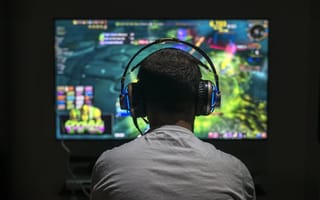
At its fourth annual expo in mid-August, gaming convention Play NYC will highlight the work of five Black video game creators from around the country through its Graffiti Games initiative.
“It was a no brainer that we use this as an opportunity to amplify and celebrate the voices of Black game developers,” Dan Butchko, the organizer of Play NYC and the founder and CEO of Playcrafting, told Built In. “Each year, Graffiti Games speaks to the moment and speaks to the time.”
Graffiti Games has spotlighted underrepresented indie voices since 2017. In its first year, it featured the work of first-generation immigrants. Last year, in honor of the 50th anniversary of the Stonewall riots, it focused on LGBTQ developers.
Now, thanks to support from Rockstar Games, Graffiti Games has given a $5,000 grant to each of this year’s developers to make a game for Play NYC 2020.
The developers are Notion Games founder Andrew Augustine, Illus Seed Games narrative designer Cara Hillstock, Nifiystudios founder Ricardo Lee, Waking Oni Games lead designer Derrick Fields, and Michelle Senteio of Looking Glass Factory.
There are almost no rules about the types of games the Graffiti Games developers should create for the online expo. The only requirements are that the games must be complete by the time of the event and appropriate for all ages.
Otherwise, developers’ games should just show the “importance of creating a safe space for all to be their authentic selves,” Butchko said.
Video Games About Roommates, Samurais and More
To Seattle-based developer Cara Hillstock, that means having a space where she can voice and explore ideas that she’s often seen shut down in her seven years in the video game industry.
“It’s a pretty hostile environment,” Hillstock told Built In. “I think minority developers especially end up having to go to battle every time they go to work because it is so difficult to ... [present] an alternative viewpoint. A majority of the time that alternative viewpoint is not actually heard; more often it’s shouted down.”
This year’s Graffiti Games strikes her as a unique opportunity to express herself.
Hillstock says she enjoys exploring “complex emotional experiences” in her work. This includes the game she is making for this initiative, “To Be With You,” which follows the experience of a girl named Elsie who moves in with a childhood friend and her long-distance boyfriend.
Then the relationship “starts taking a turn south.”
“It’s semi-autobiographical,” Hillstock said. “It’s something that I’ve been wanting to make for five years and I haven’t been able to do justice to it because I didn’t have the funding.”
All three of the Graffiti Games developers Built In interviewed were working on video game ideas they’d had for a while, but couldn’t find a way to pursue until now.
That includes artist and Chicago-based developer Derrick Fields. He is interested in the intersection between Japanese and African-American culture, and his game, “Oni Fighter Yasuke,” is about a real African samurai named Yasuke, who lived in 16th century Japan.
“I want to create experiences that not only represent me, but allow other individuals and kids that look like me to be able to see themselves” in video games, Fields told Built In.
At the end of the day, Fields’ goal of improving representation in video games is what Graffiti Games is all about.

Building a More Inclusive Video Game Industry
The video game industry as a whole struggles with diversity — not just among its characters, but also behind the scenes. In 2019, the International Game Developers Association found that only 2 percent of game developers worldwide identify as “Black/African-American/African/Afro-Carribean,” while 81 percent identify as “white/Caucasian/European.”
“Long term, the game industry is going to become more friendly and more inclusive — I think that’s almost inevitable,” Hillstock said. “It’s more of a matter of: How long is that long term going to take?”
Fields shared a similar viewpoint, citing the recent widespread support of the Black Lives Matter movement among large companies in the video game industry and beyond.
“A lot of these companies are the same spaces that statistically underhire, not only women, but Black individuals and individuals from the LGBTQIA community,” Fields said. “I just hope that it isn’t a blip in time.”
Still, as indie games grow more popular and as the audience playing these games continues to shift toward Black and Latinx youth, the industry is going to change.
“Indie games are catching people’s attention because there’s a level of heart that goes into making [them],” Graffiti Games developer Ricardo Lee told Built In. “This is definitely a good time for people that are very creative to put themselves out there ... the next big thing could be you.”
This year’s free, online-only Play NYC expo will run from August 10-16, and feature a mix of speakers, video game live-streams, panels and demos. Tickets can be reserved here.




